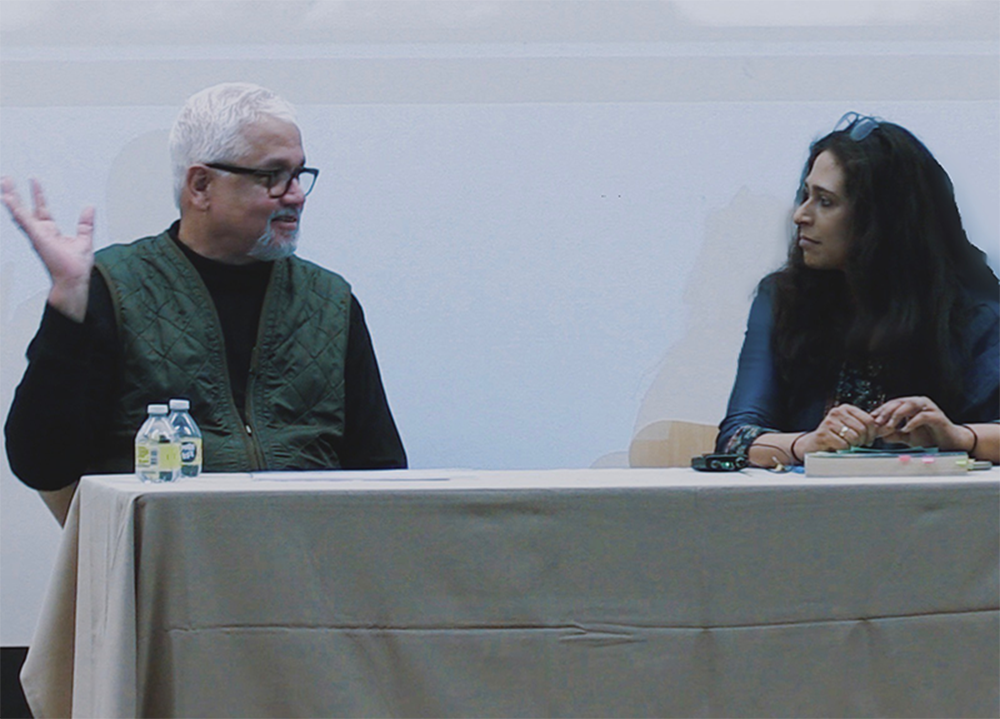Reposted from UCLA Newsroom
Jonathan Riggs | May 19, 2023
Focusing on his 2021 nonfiction work “The Nutmeg’s Curse: Parables for a Planet in Crisis,” Amitav Ghosh gave an impassioned presentation on May 17 at UCLA’s third annual Edward W. Said Lecture, convened by Anjali Prabhu, UCLA professor and Edward W. Said Chair in Comparative Literature.
“It is a great pleasure and privilege to be here today with so many old and new friends, and it is really extraordinary to be delivering the Edward W. Said Lecture,” Ghosh said. “I met him several times in New York in the gym where he loved to play squash. It is hard to think that he is gone. We all know what a giant he was.”
Winner of numerous awards, including India’s highest literary honor, and named one of the world’s most important global thinkers by Foreign Policy magazine, Ghosh has published many acclaimed works of both fiction and nonfiction, including “The Great Derangement: Climate Change and the Unthinkable,” “The Glass Palace” and “In an Antique Land.”
In his lecture, Ghosh described how the Dutch conquest of the Banda Islands in the 17th century echoes through time, especially when it comes to enduring Western views of the world. At the time Earth’s only producers of nutmeg and mace, these islands were remotely located in the Indian Ocean but became a global flashpoint due to how expensive those spices became — at one point, they were so valuable that a handful of nutmeg could buy a house in Amsterdam.

UCLA
Amitav Ghosh in conversation with Anjali Prabhu, UCLA professor and Edward W. Said Chair in Comparative Literature during UCLA’s third annual Edward W. Said Lecture.
“The Dutch had become the globally dominant maritime power in the late 16th century and were absolutely fixated on establishing monopolies on cloves, nutmeg and mace, and so they tried to force a treaty upon the Bandanese,” Ghosh said. “The Bandanese fought back as best they could — they were a very tiny community — and eventually the Dutch decided the Banda problem needed a solution.”
Hiring 300 Japanese rōnin — samurai who acted as mercenaries — the Dutch military massacred or enslaved almost all of the population. The irony that the island’s volcanic ecology had made it possible for the nutmeg tree to exist and to enrich the Bandanese, only for that resource to eventually be linked to these atrocities against them, suggested modern parallels to Ghosh.
“The Bandanese were among the first people on the planet to fall victim to what we might call the globalization of resources — an immense sort of extractivism that now runs rampant across the globe,” Ghosh said. “Today, we think we are no longer dependent on Earth’s provisions, but the idea that we are somehow free of them is a complete delusion.”
Giving respect and a voice to nonhuman entities such as plants, animals and even natural elements, falls largely to storytellers in Western modernity, according to Ghosh. He went on to add that the animal, botanical, mineral and elemental all have their own languages and ways of speaking, which for too long have been dismissed at our own peril.
It is all of a piece with the abusive relationship humans often take with the Earth. By stripping the natural world of its agency, modern humanity can perpetuate and even justify harmful practices, environmental and otherwise, the way that the Dutch did with the Bandanese.
“Much, if not most of humanity today lives as colonialists once did, treating the Earth as though it was an inert entity that exists primarily to exploit,” he said. “But we are making the realization that in refusing to listen to voices other than our own, we have invited doom not just on ourselves, but on those humans who through the last few centuries, in the face of unrelenting apocalyptic violence, have continued to insist that nonhumans can, do and must speak.”
This year’s Edward W. Said Lecture, offered by the UCLA Department of Comparative Literature, was co-sponsored by the UCLA Division of Humanities with generous support from the UCLA Department of European Languages and Transcultural Studies, the Kahn Chair, the UCLA Alan D. Leve Center for Jewish Studies, the Goetz Chair and the UCLA Center for India and South Asia.
For this, the first in a series of events to come during the course of her tenure, UCLA professor Anjali Prabhu gave introductory remarks highlighting Ghosh’s role in underscoring the need for new forms of fiction to address the climate crisis, as well as his influence on a range of academic disciplines within and beyond the humanities.
“We are so proud to welcome this brilliant thinker of our time,” said Prabhu. “I’m excited to be able to convene these types of events and make the humanities available and relevant to the larger community through my appointment as the Said Chair, as much as I am to be able to pursue my own research.”

